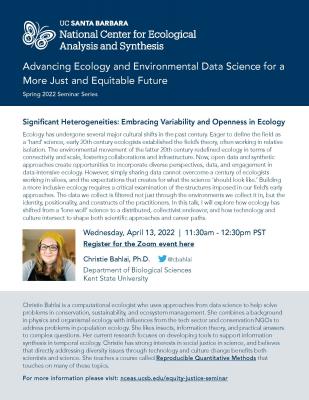
- This event has passed.
NCEAS Spring 2022 Seminar Series Significant Heterogeneities: Embracing Variability and Openness in Ecology by Christie Bahlai, Ph.D.
April 13, 2022 @ 11:30 am PDT

Join us for an NCEAS seminar series motivated by conversations about how we can foster diversity and inclusion within our scientific community, while also designing research questions and approaches to promote environmental justice and equity across our broader community. The speakers will share their research approaches and findings as they relate to the intersections of ecology, environmental data science, equity, and environmental justice.
Ecology has undergone several major cultural shifts in the past century. Eager to define the field as a ‘hard’ science, early 20th century ecologists established the field’s theory, often working in relative isolation. The environmental movement of the latter 20th century redefined ecology in terms of connectivity and scale, fostering collaborations and infrastructure. Now, open data and synthetic approaches create opportunities to incorporate diverse perspectives, data, and engagement in data-intensive ecology. However, simply sharing data cannot overcome a century of ecologists working in siloes, and the expectations that creates for what the science ‘should look like.’ Building a more inclusive ecology requires a critical examination of the structures imposed in our field’s early approaches. The data we collect is filtered not just through the environments we collect it in, but the identity, positionality, and constructs of the practitioners. In this talk, I will explore how ecology has shifted from a ‘lone wolf’ science to a distributed, collectivist endeavor, and how technology and culture intersect to shape both scientific approaches and career paths.
Wednesday, April 13, 2022
11:30am – 12:30pm PDT
Zoom Event | Learn more & RSVP to Christie’s talk: https://ucsb.zoom.us/webinar/register/WN_I_8z0e93Sty8T6stu95hhA


